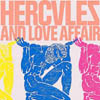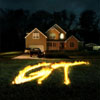 Our somewhat semi-regular feature covering the newest dance singles goes full-length this week, reviewing new albums by Hercules and Love Affair, Syclops, Girl Talk and Ladytron.
Our somewhat semi-regular feature covering the newest dance singles goes full-length this week, reviewing new albums by Hercules and Love Affair, Syclops, Girl Talk and Ladytron.
Hercules & Love Affair, "Hercules and Love Affair"
DFA/Mute
I've written about Andy Butler's classicist disco/house project in this feature previously (catch up here), but recently the full-length self-titled album dropped on DFA/Mute. As promising as Butler's early singles were, in the world of dance music, good singles are rarely any guarantee of a solid long-player. For better or worse, dance music is a genre driven almost exclusively by singles, and I can count on one hand the number of full-length dance albums that could be considered great. Also, DFA hasn't been maintaining a very good track record lately, with questionable signings like Prinzhorn Dance School and Shocking Pinks. Given these low expectations, I was blindsided by Hercules & Love Affair's debut, chock full of gorgeous dancefloor excursions for nearly its entire length, with very few tracks that fall below the bar set by Butler's early singles. It's also incredibly cohesive for a dance album, with a narratively sequenced suite of songs that travels from lush romanticism, to dark introspection and finally to ecstatic celebration. More than half of the tracks feature Antony Hegarty on lead or backup vocals, a role for which, it must be said, Antony was born. Moonlighting as a House Diva, Antony's campy, melodramatic vacillations are the perfect counterpoint for Butler's modernist take on disco and house. Most the tracks also feature live instrumentation—a full horn section, strings, acoustic and bass guitar. This makes the album stand out against an overpopulated field of laptop-centric "blog house" albums being released on indie labels. I haven't been this excited about the possibilities of live, organic dance music since the first !!! album was released. Almost every track here is a winner, but standouts include "You Belong," a stunning house track with soulful lead vocals by Nomi that recall classic cuts by Inner City, and "Iris," a haunting slow-burner with Kim Ann Fox doing lead vocals against uncannily good rhythm programming and horn sections. "Hercules' Theme" extensively mines pure 1970s mirrorball territory, complete with swooping strings and horn fanfares. As such, it's a consciously retro as the album gets; though Butler often looks to the past for inspiration, his compositions are always forward looking, and there's no question that this album is a product of the '00s. The album hits its creepiest moment with the dark, atmospheric (and un-danceable) "Easy" and the deceptively upbeat "Raise Me Up," on which Antony's lyric is truly frightening, relating a harrowing tale of rape: "They put you down/They pushed your face down/They fucked you over and around/You kissed the ground." Things end on a bright, transcendent note with "True False, Fake Real," which manages to synthesize all of Butler's various approaches, ending with a joyous overture that seems to reprise all of the album's themes.
sample:

Syclops, "I've Got My Eye On You"
DFA
Back when I reviewed Syclops' first single for DFA ("Where's Jason's K"/"Monkey Puss"), I claimed that Syclops was a new moniker for the great Maurice Fulton AKA Dr. Scratch. Allow me to apologize, as it appears this was at least partly mistaken. Though Fulton does take on production duties for the singles and album, and does seem to be a key part of the group, Syclops also counts among its members a trio of musicians from Finland. Press releases from DFA have been very mysterious and tight-lipped about who and what exactly Syclops is, perhaps as a way of increasing the mystique around this most idiosyncratic and original of albums. The music made by Syclops is a study in dynamic tension and oddball juxtaposition. Most of the tracks combine live playing with cannily sequenced rhythms and synths, moving between outré, whimsical experimentation and outright dancefloor groove. It's a very tricky balancing act, and I fully expected one of Syclops' tendencies to dominate the other, but amazingly, they remain perfectly balanced throughout. Or more accurately, they remain perfectly imbalanced throughout, turning lopsidedness into a virtue. The opener, "Nr17," combines wonky analog synths with a driving technoid beatscape including hand-played congos, making frequent drops into dubby space echo. Structurally, these tracks are all over the place, creating appealingly shapeless, amorphous compositions in which it is never clear where the track is going. Syclops are often almost too innovative for their own good; it might be to their advantage to occasionally just "give up the goods," as it were, rather than continuing to tease the groove by making it take a back seat to unorthodox, goopy strangeness. However, giving up the goods isn't what Syclops are about; they are about creating a new mutant hybrid of free-form experimentalism and precise techno, two seemingly irreconcilable extremes that nonetheless meet and erotically palpate each other's tentacles across the void. Just listen to a track like "Nelson's Void," which starts in Nurse With Wound territory—weird alien chirps, organ drones and loads of delay—before suddenly transforming into an off-kilter Underground Resistance-style groove, complete with farty analog synth bass, live drums, understated keyboard arpeggiations, complex jazz breaks and dubstep-style resonation. For every track like that one, there is one like "5 Out," which sticks more closely to the techno formula, but is no less audacious and experimental in its breathtaking dynamism and surrealistic juxtapositions. Syclops is the work of four supremely talented musicians who are fearlessly blowing open the doors of techno and creating a style that is absolutely without peer.
sample:

Girl Talk, "Feed the Animals"
Illegal Art
Girl Talk's new album, his follow-up to the perennial favorite Night Ripper, is the newest in a line of high-profile releases being distributed online as a choose-what-you-pay download. For an artist whose music is almost entirely composed of unlicensed samples from other artists' work—most of those artists major label HipHop acts and ubiquitous mainstream top 40 music—this move may have been more strategic than anything else, a way of heading off the inevitable lawsuit. Whatever the reasons, I was quite happy to be able to download a lossless version of the album for only $5.00 US. Much like Night Ripper, Feed the Animals is formulated to be no-holds-barred, balls-out party music: only the hooks from a host of familiar radio jams all smashed together into a dizzying sequence of seamless mashups, prankish bastard pop and crowd-pleasing cut-ups. It's collage as pop art, and no one does this better than Girl Talk. Somehow, Gregg Gillis is able to keep the beat moving while he cycles through a completely mind-boggling array of mismatched pop music samples. The first track alone ("Play Your Part Pt. 1") samples over 25 distinct songs, all the way from UGK to Roy Orbison, from Lil Wayne to Twisted Sister, from Ludacris to Sinead O'Connor. Half the fun of a Girl Talk album is track-spotting, the pedestrian pleasures of familiarity and recognition, which quickly give way to delighted laughter over the audaciousness of the weird or unexpected musical cross-breeds engineered by Gillis. An album like this is not for the anhedonic music connosieurs who make a point of scrupulously avoiding the vulgar pleasures of MTV pop. This shit takes shamelessness to a whole new, frenetic, short-attention-span level. Some favorite moments of mine include the mashup of Procul Harum and Kanye West on "Still Here," the breathless sequence of the Jackson 5, Queen and Rihanna at the end of "What It's All About," and the completely ridiculous segue from Prodigy's "Firestarter" into Chris Brown rapping over Rick Springfield's "Jessie's Girl." This and many more WTF moments make Feed the Animals worth a repeat listen beyond the initial novelty. Throw this on at a party and only the hardened snobs will complain.
sample:

Ladytron, "Velocifero"
Nettwerk
And then there was Ladytron. They rose to prominence about the same time that the so-called electroclash sound hit the big time, and because of some superficial similarities, got unfairly lumped into the whole sassy punk electronic scene. The association was a poor fit for Ladytron, because they were aiming at something a lot more demure and artsy, or so it seemed. There were plenty of self-conscious retroisms, to be sure, but their cold, clinical vocals and indie rock posturing seemed to position them as a new millennial, poppy version of Young Marble Giants as reimagined by Travelogue-era Human League. However, with each successive album after their initial one-two punch of 604 and Light & Magic, Ladytron have worn out any good will that casual listeners might have been willing to extend. Seemingly content to just repeat a formula ad nauseum, rather than actually writing memorable songs, Ladytron have been treading water in a sea of effortless hipster cool. However, as the years have moved on, Ladytron's audience have shifted from hipsters to goths, ravers, and other forms of club trash. This may explain their new home on Nettwerk, which is where music goes to die. This new album tries to reignite the flame but still play to their base, so mixed in with Witching Hour-style dense synthpop are some attempts at 1960s Girls in the Garage-style rock. The problem is that Ladytron are too self-conscious and polished to pull off anything resembling the joyous looseness of garage rock, and thus a track such as "Black Car" goes seriously off the rails, trying to be both goth-tinged new wave, Stereolab-esque backward-looking nostalgic rock, and ultra-modern angular haircut synthpop. It's a hybrid that doesn't work for most of Velocifero, mostly because the songs are underwritten and lack memorable hooks. On a few tracks, the group attempts to bury the synths in favor of loud rock with a huge wall of swirling guitar feedback a la Ride or My Bloody Valentine. The attempt is risible, merely another self-consciously "cool" musical reference point for Ladytron to exploit, as if merely having good taste will obscure the fact that the band is now officially irrelevant. I anxiously await the inevitable spate of 12" singles with remixes by various dance producers, as this material could only improve by being completely re-tooled. Yeah, it's that bad.
sample:
Read More

